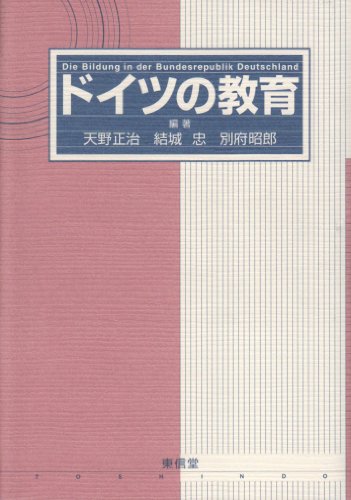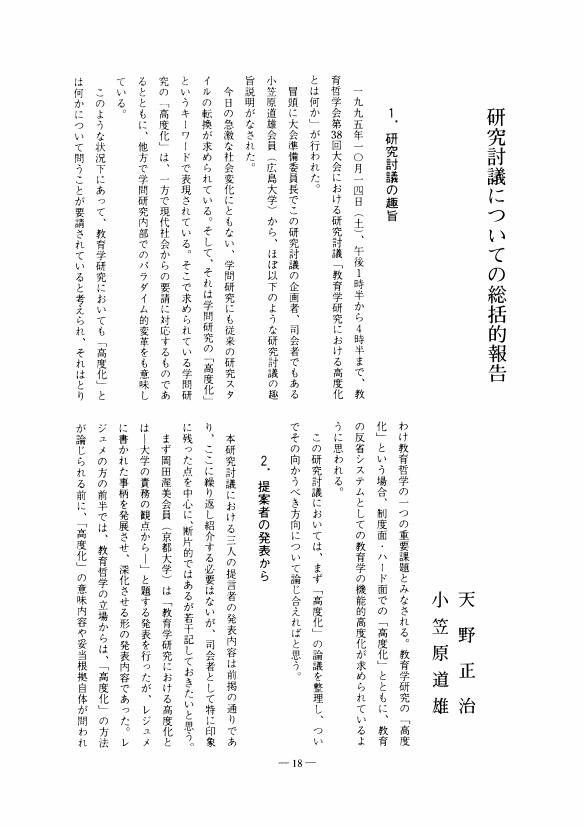1 0 0 0 ドイツの教育
- 著者
- 天野正治 結城忠 別府昭郎編著
- 出版者
- 東信堂
- 巻号頁・発行日
- 1998
1 0 0 0 OA 研究討議についての総括的報告
- 著者
- 天野 正治 小笠原 道雄
- 出版者
- 教育哲学会
- 雑誌
- 教育哲学研究 (ISSN:03873153)
- 巻号頁・発行日
- vol.1996, no.73, pp.18-23, 1996-05-10 (Released:2009-09-04)
1 0 0 0 OA 最近における西ドイツ教育改革の動向 留学の報告にかえて
- 著者
- 天野 正治
- 出版者
- 教育哲学会
- 雑誌
- 教育哲学研究 (ISSN:03873153)
- 巻号頁・発行日
- vol.1974, no.30, pp.46-52, 1974 (Released:2009-09-04)
- 著者
- 天野 正治
- 出版者
- 教育哲学会
- 雑誌
- 教育哲学研究 (ISSN:03873153)
- 巻号頁・発行日
- vol.1970, no.22, pp.1-19, 1970-10-10 (Released:2010-01-22)
- 参考文献数
- 34
It can de safely said, that among the theoriste of University reform in contemporary West Germany, H. Schelsky and R. Dahrendorf develop a common reform theory. That is to say both analyse the contradiction and the gap existing between Humboldt's theory which for a long time was applied as the dominant theory of the German University and the university in its reality, and they demand a fundamental reform based on this analysis. However, in doing so they maintain strorm the validity of Humboldt's traditional idea within the process of such a fundamental reform and they examine the present day direction of its institutional realization.In this paper the attempt is made to propose one theory and one viewpoint on university reform in contemporary West Germany centered around the the theory of these two men. In the first chapter Humboldt's idea of a unversity is examined once again, in the second chapter the gap between this concept and the situation of the West German university and the underlying cause of this gap is examined on the basis of the ideas of the two authors mentioned above, finally in third chapter the reform idea of new universities such as Bielefeld, and. Bochum is examined, together with the problem of how to evaluate positively Humboldt's idea within the context of modern university reform and the question of how the two theorists believe it should be concretely implemented institutionwise. The viewpoint of Schelsky and Dahrendorf present but one out of many views on the ideal of the university in contemporary West Germany, but in their positive attitude toward reform, and in their affort to accomplish a harmony between tradition and revolution, the meaning of this effort must be held in high esteem. Also judging fro the fact that their reform ideas are being implemented in some new universities, it can be predicted that their viewpoint will become effective as a powerful reform theory in the development of university reform in West Germany.
1 0 0 0 OA シュプランガーの内面的学校改革について 戦後シュプランガー教育思想の一考察
- 著者
- 天野 正治
- 出版者
- 教育哲学会
- 雑誌
- 教育哲学研究 (ISSN:03873153)
- 巻号頁・発行日
- vol.1960, no.3, pp.60-77, 1960 (Released:2010-01-22)
- 参考文献数
- 49
This essay pressents some considerations on the post-war educational thinking of the renowned German scholar, Eduard Spranger. It is his theory of culture wich forms the background and the foundation of his post-war thinking. For the sake of convenience, this theory is divided into three parts : a general theory of culture ; criticism of modern culture ; criticism of the culture of west Germany. Modern culture, as Spranger sees it, is in a diseased state. He argues that it can be restored to a state of health through an improvement in its moral, legal, and political functioning, and to this end education for consientious living and for political activity based on a moral foundation must be carried on. If we look at school education from this point of view, we see that it must be thoroughly reformed ; and this is Spranger's contention. The concrete development of his theory is precisely his “theory of the inner renovation of the school.” Consequently, I have taken this expression of Spranger as the leit-motif of his post-war educational thought and traced its concrete development from the point of view of the objectives, the content, and the social aspects of education.


